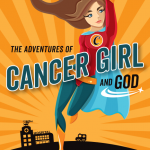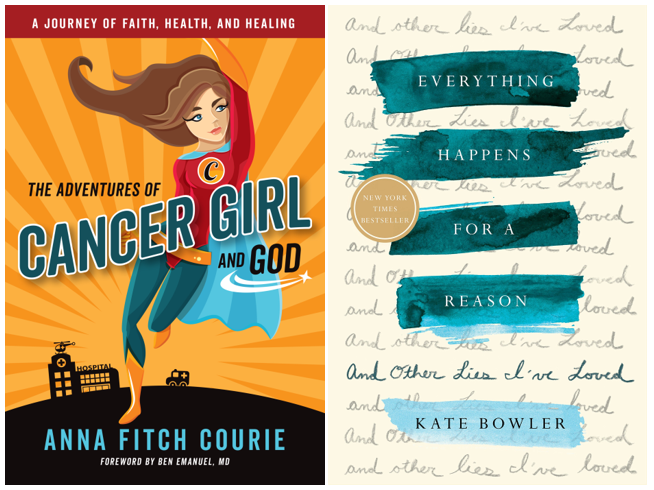by Elizabeth Felicetti
Three years ago, a thirty-two-year-old parishioner who had been married less than two years, whose wife was expecting their first child, was diagnosed with inoperable brain cancer and died five months later. This remains one of the most devastating pastoral situations I’ve endured in eleven years of ordained ministry.
Two new books address thirty-something parents with cancer through first-person experience colored by theological lenses: Everything Happens for a Reason and Other Lives I’ve Loved by Kate Bowler and The Adventures of Cancer Girl and God by Anna Fitch Courie. Both authors were mothers in their thirties at the time they were diagnosed, and both live and struggle with serious, incurable cancer diagnoses.
Bowler, an assistant professor at Duke who wrote Blessed: A History of the American Prosperity Gospel, writes of living with stage IV colon cancer. Bowler opens with her diagnosis, and writes especially movingly about the seasons of Advent and Lent. The longing of those church seasons permeates Everything Happens for a Reason. In the preface, Bowler writes, “I don’t think I knew enough about longing ten years ago, when I started investigating the prosperity gospel” (xviii). Bowler’s diagnosis enables her to experience yearning in a deep, personal way. Living with cancer, the season of Lent became especially important to Bowler: “I am facing death and the church has demanded that, for the forty days of Lent, everyone stare it down with me” (133). She soon became frustrated, however: “‘Everyone is trying to Easter the crap out of my Lent,’ I say to my friends through gritted teeth” (134).
Courie is a nurse and blogger who turned a 40-day religious fitness program she created, “Christ Walk,” into a previous book. Courie structured her cancer journey in The Adventures of Cancer Girl and God in a similar format to “Christ Walk,” in thirty-five chapters, each containing two sections: “How I Felt,” which reads like raw journal or blog entries, followed by “What I Learned,” reflecting on the original entry through a distance of a year or two. Each chapter concludes with questions and space for the reader to reflect on their own experience, and could be used as a workbook or journal for someone with cancer. Like Bowler, Courie’s book opens with her diagnosis: “I just found out I have cancer” (1), noncurable follicular lymphoma. In addition to frank discussions about anger and anxiety, Courie’s book includes a few recipes, one healthy (a smoothie) and several comfort foods (baked egg custard, chocolate roll, pizza).
Both writers include practical advice for readers. Bowler’s advice is geared more toward family and friends than Courie’s, which often directly addresses someone suffering from cancer. For example, Bowler includes two appendices: “Absolutely Never Say This to People Experiencing Terrible Times: A Short List,” and “Give This a Go, See How It Works: A Short List.” Courie’s book, on the other hand, contains questions followed by space for journal entries such as, “What frustrates you most about your body right now” (155) and “On a scale of 1-10, how annoyed are you when people ask how you are?” (104)
Both writers address that question of “How are you” or “How are you really?” Bowler writes, “I can hear you trying to understand my world and be on my side. But picture the worst thing that has ever happened to you. Got it? Now try to put it in a sentence. Now say it aloud fifty times a day.” (171-172) Courie writes about the question “How are you”: “Is it someone who really wants to know? Is it someone that can handle the full kahuna? Is it someone that will understand ‘how I am’ changes from moment to moment? Or is it someone that I need to reassure that everything is going to be ok?” (99)
Both authors enrich their books by showing readers a view of their communities of support. Bowler writes, “This will turn out to be one of the great advantages of working at Duke Divinity School—all my friends are pastors. There is a flood of pastors not only in my room but in the nearby waiting room and in the divinity school’s own chapel, where the community had decided to come together and pray me through my surgery” (54). Meanwhile, Courie is a military spouse who endured yet another military move in the midst of her diagnosis. Readers get glimpses into how military families form tight bonds quickly. In addition, Courie’s nursing experience permeates her chapter “Ten Bits of Advice for the Healthcare Industry,” written while she was sitting in radiology for hours waiting for a CT scan. “Be a patient for a day” (138), Courie advises her fellow medical professionals, as well as “It’s okay if patients cry” (140).
As a priest with parishioners constantly facing dire diagnoses, I found these books helpful in increasing my empathy for those living with cancer, and recommend them for others seeking a deeper understanding of loved ones with cancer. I don’t recommend giving books to people with cancer unless the person explicitly desires such books.
 Everything Happens For A Reason: And Other Lies I’ve Loved
Everything Happens For A Reason: And Other Lies I’ve Loved
Kate Bowler
ISBN:9780399592065
Penguin Random House

The Adventures of Cancer Girl and God
Anna Fitch Courie
ISBN: 9781640650107
Church Publishing
The Rev. Elizabeth Felicetti is the rector of St. David’s Episcopal Church in Richmond, Virginia, and pursues an MFA in Writing at Spalding University. Her nonfiction and poetry have appeared in several spiritual and literary periodicals, and she has critical essays forthcoming in the lectionary commentary series Connections by Westminster John Knox Press. She tweets @bizfel.

